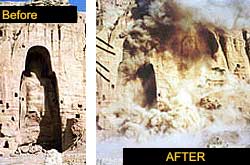UNESCO Japan panel
urges stronger cultural asset protection
The
Japan Times
Kyodo --
Reacting in part to the destruction of giant Buddha statues in Afghanistan, a subcommittee
of the Japanese National Commission for UNESCO has urged the government to strengthen
protection of cultural assets around the world, officials said.
 This is the
first time in six years that the subcommittee, headed by well-known artist Ikuo Hirayama,
has adopted a resolution delivered to the government.
This is the
first time in six years that the subcommittee, headed by well-known artist Ikuo Hirayama,
has adopted a resolution delivered to the government.
The resolution,
adopted Wednesday, says Japan needs to strengthen efforts to protect cultural assets,
particularly in light of having been a member of the United Nations Educational,
Scientific and Cultural Organization for over 50 years.
It also says
UNESCO's role is becoming increasingly important amid growing worldwide problems,
including environment, population and digital divide issues.
The resolution
urges the government to devise measures to take swift action when a cultural asset is
placed in danger by a conflict and demands it press other countries to reinforce the
protection of cultural assets.
It also calls for
increased educational support in developing countries, intended to increase literacy and
prevent the spread of AIDS.
In March, UNESCO
officials confirmed the Taliban's destruction of Buddhist artifacts in Afghanistan,
including the heads and legs of the famous giant twin Buddha statues in Bamyan Province.
The Buddhas, 55 and
38 meters tall, were carved out of cliffs about 100 km northwest of Kabul. They date from
the fifth century, long before the spread of Islam to the region in the ninth century.